模块1 Unit 1 Friendship 全套课件
文档属性
| 名称 | 模块1 Unit 1 Friendship 全套课件 |
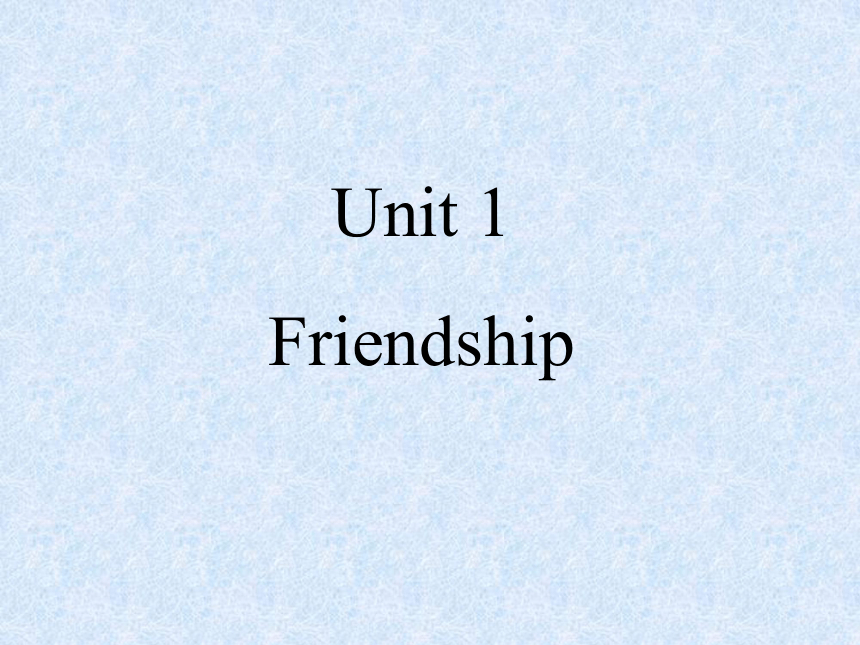
|
|
| 格式 | rar | ||
| 文件大小 | 498.4KB | ||
| 资源类型 | 教案 | ||
| 版本资源 | 人教版(新课程标准) | ||
| 科目 | 英语 | ||
| 更新时间 | 2009-03-21 00:00:00 | ||
图片预览

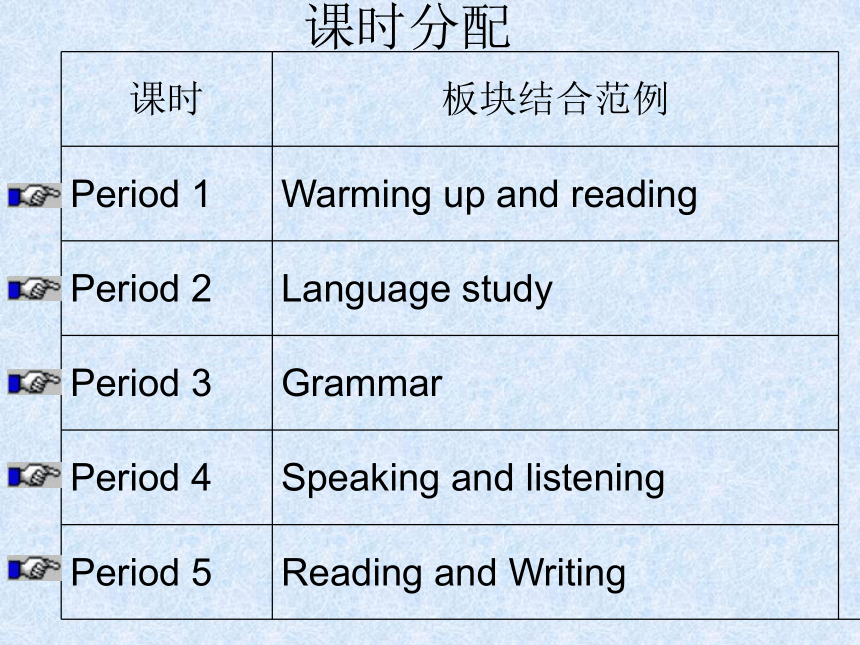
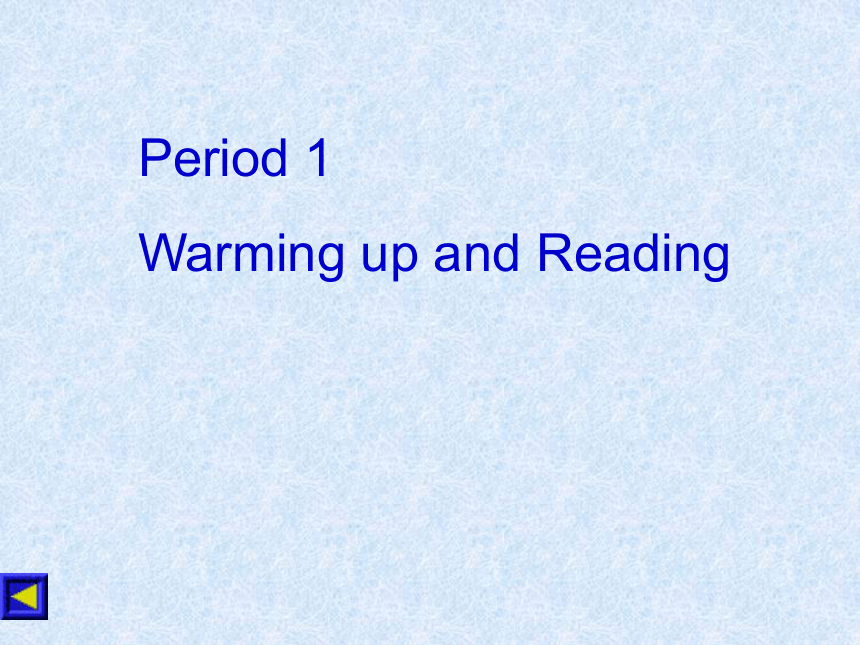


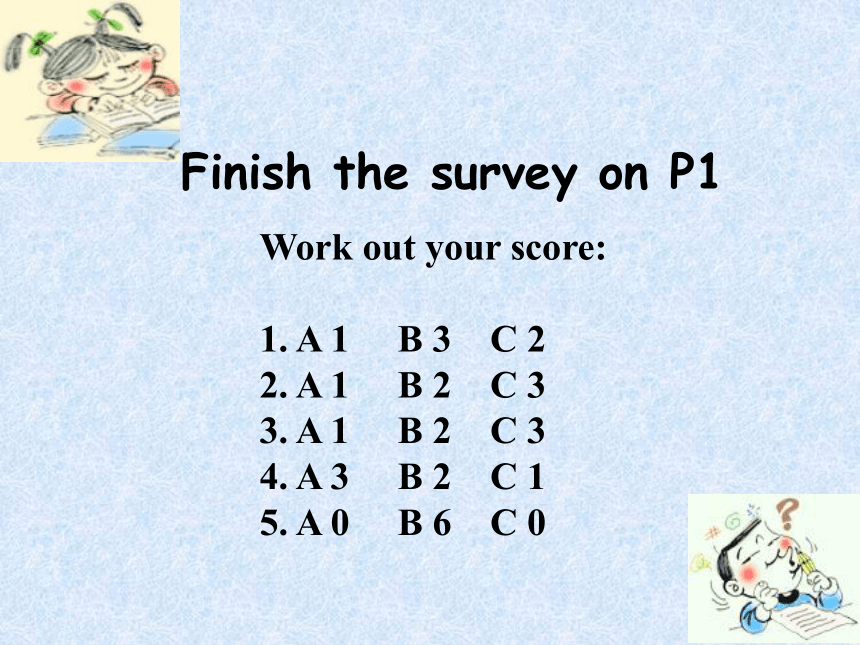

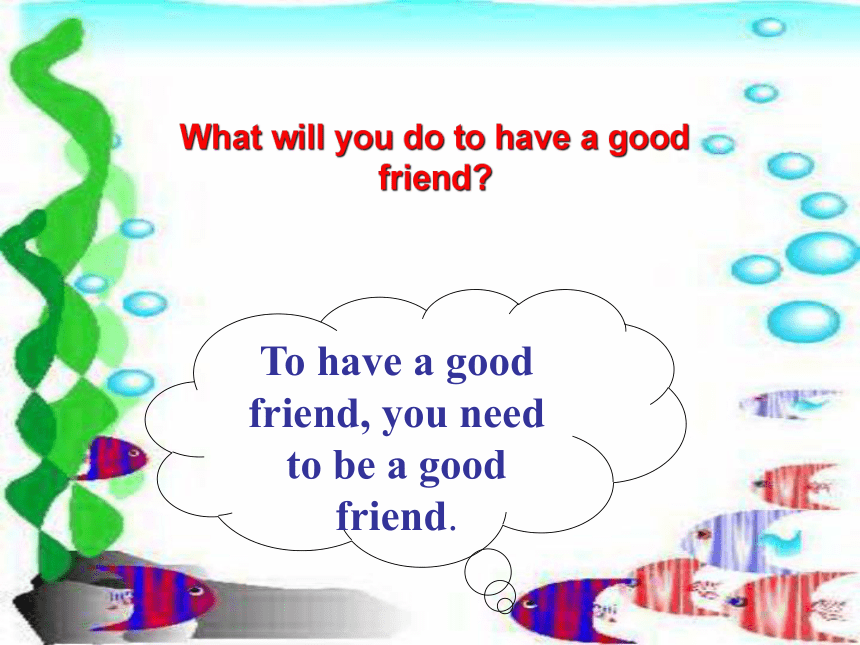
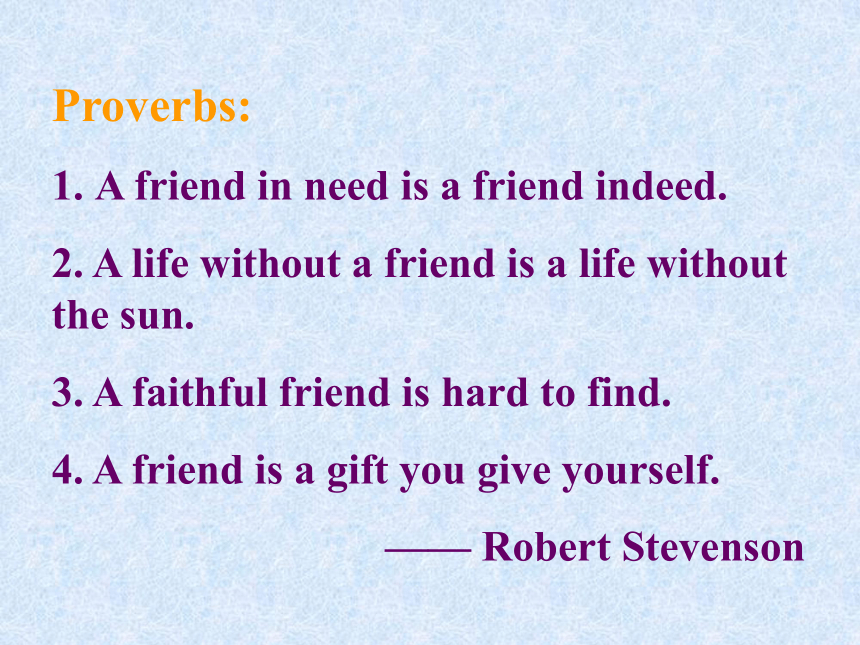
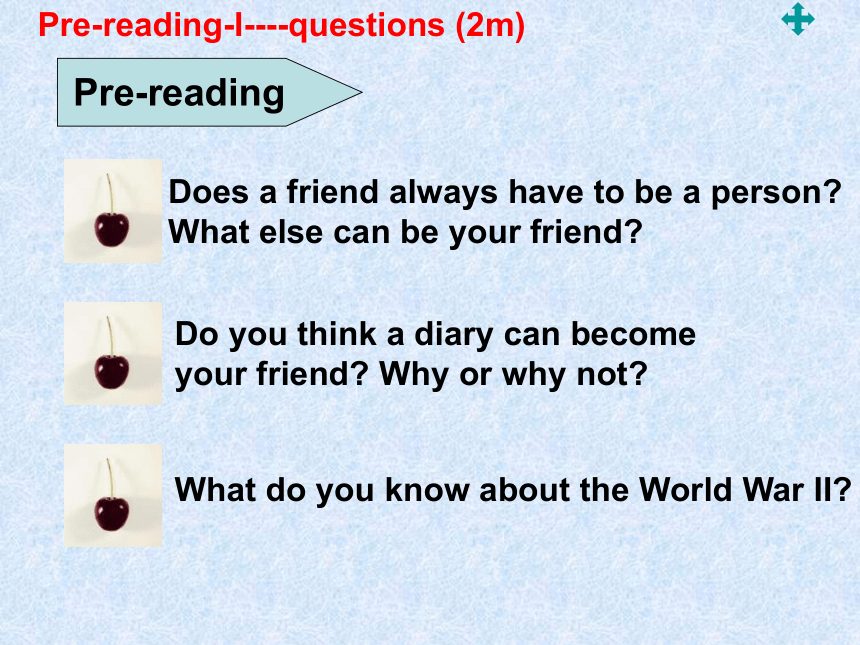
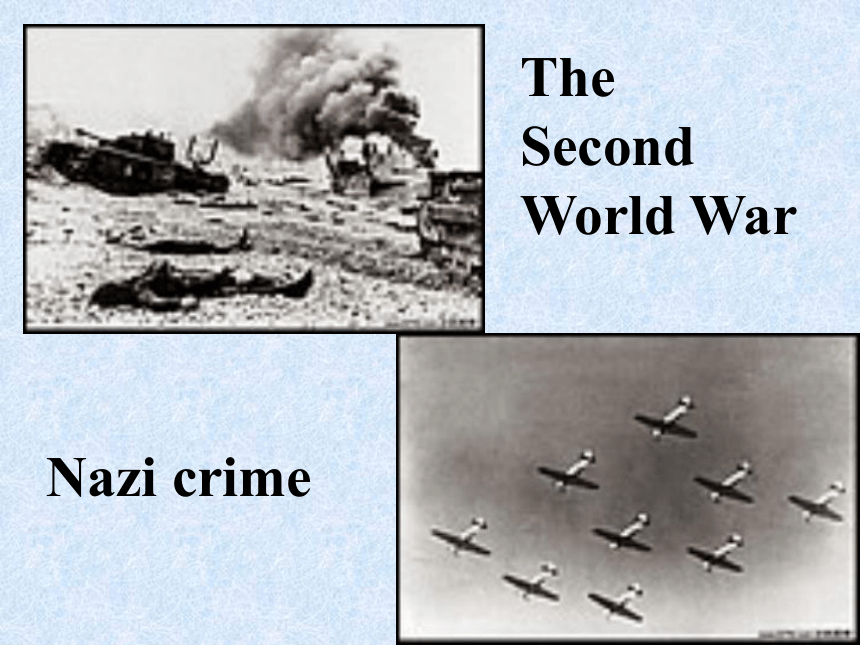
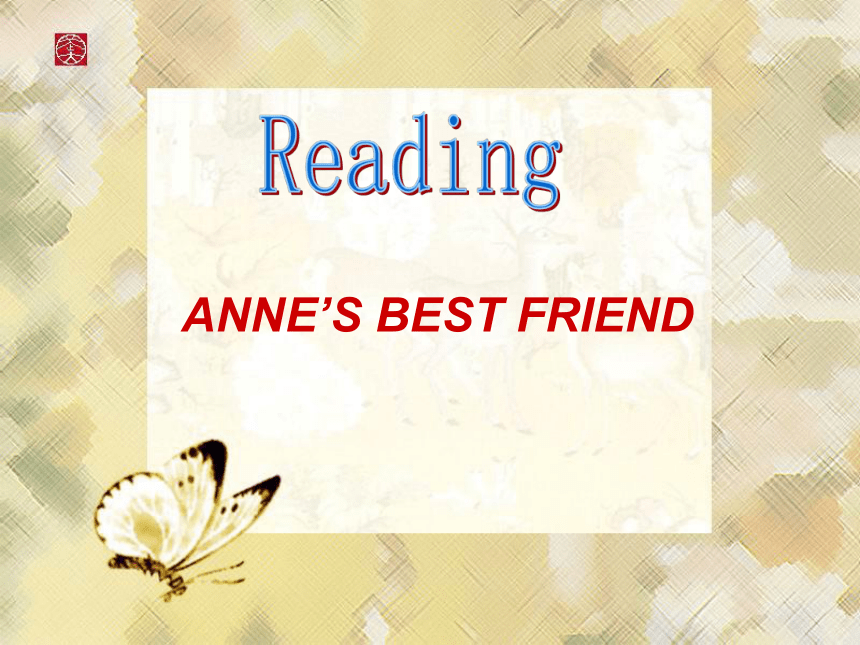
文档简介
课件69张PPT。Unit 1
Friendship课时分配Period 1
Warming up and Reading What do you think a good
friend should be like?Good friendkindhonestbravegenerousloyalhelpfulhandsomewisepatientfunnyfriendlysmart hardworking full of love
easygoing selfless responsible…Finish the survey on P1Work out your score:
1. A 1 B 3 C 2
2. A 1 B 2 C 3
3. A 1 B 2 C 3
4. A 3 B 2 C 1
5. A 0 B 6 C 0
13+ points: You are an excellent friend who knows that to be a good friend you need to balance your needs and your friend’s needs. Well done!8-12 points: You are a good friend but you sometimes let your friendship become too important, or you fail to show enough concern for your friend’s needs and your own responsibilities. 4-7 points: You are not a good friend.You either neglect your friend’s needs or just do what he or she wants you to do.You should think about what a good friend needs to do. Results:What will you do to have a good friend?To have a good friend, you need to be a good friend. Proverbs:
1. A friend in need is a friend indeed.
2. A life without a friend is a life without the sun.
3. A faithful friend is hard to find.
4. A friend is a gift you give yourself.
—— Robert StevensonPre-readingDoes a friend always have to be a person? What else can be your friend?Do you think a diary can become your friend? Why or why not?What do you know about the World War II?Pre-reading-I----questions (2m)The Second World WarNazi crime ReadingANNE’S BEST FRIENDWho/ what is Anne’s best friend?
When did the story happen?Her diary KittyThe story happened during World War II.Skimming:Reading-I----skimming (1m)What did she do during the World War Ⅱ?
Why did she do that way?
How did she enjoy herself ?She hid away in order not to be caught by the German Nazis. At the same time she kept a diary.She did that way in order not to be caught by the German Nazis. She kept a diary. Scanning:Reading-II----scanning (2m)Anne kept a diary because
She felt very lonely because
They had to hide because
Anne named her diary Kitty becauseShe couldn’t meet her friends.
Jews were caught by Nazis and killed.
She could tell everything to it.
She wanted it to be her best friend. Matching (2m)Read the passage again and fill the following form:Blue sky, songs of birds, moonlight, flowers Never felt spellboundDarkness, rain, wind, thundering cloudsGrew crazy Reading-III----filling (4m)Students work in pairs to discuss the following questions:
1. Why did the windows stay closed?
2. How did Anne feel?
3. What do you think of Anne?
4. Guess the meanings of “spellbound”, “hold me entirely in their power” from the discourse(语篇,上下文).Intensive readingReading-IV----intensive reading (5m)①?Why did the windows stay closed?
②?How did Anne feel?
③ What do you think of Anne?
Because they shut the windows in order not to be found and caught by the Nazis.She was afraid of being found and at the same time was eager to touch the outside world. Intensive Reading Give your own answers.④ Guess the meanings of “spellbound”, Use another word to substitute it.Spellbound means to concentrate with delight for some time. Interested.Language studyPeriod 2Can you retell the story of Anne?Anne lived in ____________ in the ___________ during World WarⅡ.
She made _________ her best friend. She call it ______.
She and her family hid away for nearly __________.
In her diary, she grow crazy about ___________ to do with _______.
In her diary, she said as the moon gave far too much light, she hadn’t dared _______________.
In her diary, she said she hadn’t seen the night face to face for ________________.AmsterdamNetherlandsher diaryKitty 25 monthseverythingnatureopen a window a year and a halfHello, I am Anne. I lived in….. My family was Jewish, so… . During that time,… .1 加起来
2 烦恼
3 忽视
4 担心,关心
5 故意地
6 遭受失败
7 经历,经受,检查,批准
8 放下,写下
9 为了
10 面对面 add up
upset
ignore
be concerned about/for…
on purpose
suffer defeat
go through
set down
in order to
face to faceLanguage points11 根据
12 与某人相处
13 与某人相爱
14 藏起来
15 让某人着迷
16 保持清醒
17 关押起来
18 平静下来
19 对…狂热
20 一系列
according to
get on/along with sb.
fall in love with sb.
hide away
keep sb. spellbound
stay awake
put away
calm down
be/grow crazy about
a series of add A to B
add up (to)
1.The cost of the trip to Hong Kong ___ no more than $1000.
A.adds to B.added to C.add up to D.added up to
2. Nine ___ six makes fifteen.
A.added B.adding to C.added to D.added up to
upset (vt./vi./adj.)
feel upset
upset a bottle of ink
upset the enemy’s plan
upset sb.
1.他没能按时完成工作,为此他心烦意乱。
Because he didn’t finish the work on time, he was very upset about it.
2. If the rain keeps falling, it will ___ our whole plan.
A.damage B.upset C.harm D.give up ignore (vt.)
ignorant (adj.)
ignorance (n.)
be ignorant of =be in ignorance of 不知某事
____ the child if he misbehaves, and he will soon stop.
A. Ignoring B. Ignore C. Be ignorant of D. Disregard concern (vt./n.)
be concerned about/ for… 担心,关心
be concerned with sth. 与…有关
n./pron.+concerned 有关…的
Why is she so concerned ___ his attitude to her work?
A.to B.with C.in D.about
2. Present at the meeting were leading members of the departments ___.
A.concerning B.concerned C.concerns D.concernreason
reason for (doing) sth.
The reason why/that…
The reason ____ he came late was ___ his car had broken down half way.
A. why, because B. that, because
C. that, since D. why, that on purpose
for the purpose of
1.---___ did he came?
---I’ve no idea.
For which purpose B. For the purpose of
C. On purpose D. For what purpose
2. --- Look! The telephone is broken. Someone damaged it ___ purpose.
---That may be right. But perhaps it was broken ___ accident.
A.on;by B.by;by C.on;on D.by;on suffer
suffer from cold and hunger
suffer from a bad stomache
suffer pain/defeat
go through经历,经受,检查,批准
go through with sth. 完成必要的事或采取某行动
他们的计划得到了批准。
Their plans went through.set down
I’ll set you down on the corner. (set sb. Down)face to face adv.
face-to-face adj. according to
1.按照形势的变化
according to the change of the situations
2.我会按照你的指示去做的。
I’ll do it according to your instructions.
Difficult sentences:
While walking the dog, you were careless and it got loose and was hit by a car.
I wonder if it’s because I haven’t been able to be outdoors for so long that I’ve grown so crazy about everything to do with nature.
…it was the first time in a year and a half that I’d seen the night face to face.
You will tell her/him should have studied. Grammar直接引语和间接引语Direct and Indirect SpeechPeriod 3Grammar: Direct and Indirect Speech (1)转述他人的陈述→陈述句→ She asked me what I was doing.1) He said , “I’m going to Beijing.”→ He said that he was going to Beijing.2) He asked, “Are you a teacher?”→ He asked me if /whether I was a doctor.3) She said , “What are you doing?”2. 转述他人的疑问→一般疑问句3. 转述他人的问题→特殊疑问句 直接引语变成间接引语,句子结构的变化 He said, “I have been to the Great Wall.”
He said to us that he had been to the Great Wall.
He said, “I'll give you an examination next Monday.”
He told us that he would give us an examination the next Monday. 陈述句
用连词that引导,that在口语中常省略。主句的谓语动词可直接用引语中的said, 也可用told来代替,注意,可以说said that, said to sb. that, told sb. that,不可直接说told that解题步骤:1.陈述句:“I don’t like computers,” Sarah said to her friends.Sarah said to her friendsthat saiddidn’tsheSarah said to her friends that she didn’t like computers.Sarah一般疑问句 He said, “Do you have any difficulty with pronunciation?”
He asked (me) whether/if I had any difficulty with my pronunciation.
He said, “You are interested in English, aren't you?”
He asked whether I was interested in English. 间接引语用连词whether或if引导,原主句中谓语动词said要改为asked(me/him/us等),语序是陈述句的语序2.一般疑问句:
Is it easy to improve the condition of the soil?
( They asked him )They asked himifIt is easy to improve the condition of the soil.it is easy to improve the condition of the soil.askediswasThey asked him if it was easy to improve the condition of the soil.特殊疑问句 He said to me,“What's your name?”
He asked me what my name was.
He asked us, “How many car factories have been built in your country?”
He asked us how many car factories had been built in our country. 原来的疑问词作为间接引语的连词,主句的谓语动词用ask(sb. )来表达,语序改为陈述句语序3.特殊疑问句:
When do you harvest the wheat ?
( They asked him )They asked himWhenyou harvest the wheatyou harvest the wheat.heharvestedThey asked him when he harvested the wheat.选择疑问句 He asked, “Do you speak English or French?”
He asked me whether I spoke English or French.
I asked, “Will you take bus or take train?”
I asked him whether he would take bus or take train. 用whether…or…表达,而不用if…or…,也不用either…or…
5. 注意地点的变化在直接引语变为间接引语时需要注意的变化1. 注意时态的变化2. 注意人称变化。3. 注意指示代词的变化4. 注意时间的变化6. 注意个别趋向动词的变化When you change a sentence from direct speech to indirect speech, you sometimes need to change the verb tense. You may also need to change pronouns , time in order to keep the same meaning.Direct indirect
Present past
Past past and past perfect
Present perfect past perfect
Past perfect past perfectThe geography teacher told us that the sun rises in the east and sets in the west.谓语动词时态变化需要注意几点:1.直接引语表述的是客观真理,变为间接引语时,时态不变The geography teacher said, “The sun rises in the east and sets in the west.”She says that she’ll never forget the days in the country.2. 如果直接引语所表述的内容在目前和说话时同样有效,变间接引语时,时态可不变The children said, “We love this game.”They told us that they love that game.3.主句谓语动词的时态是现在时态,在引述时,时态不变。She says, “I’ll never forget the days in the country.”1. 当主句的谓语动词是将来时的时候
2. 当直接引语部分带有具体的过去时间状语时
3. 当直接引语中有以when, while引导的从句,表示过去的时间时
4. 当引语是谚语、格言时
5. 当直接引语中有情态动词should, would, could, had better, would rather, might, must, ought to, used to, need时 从句时态无须改变的还有以下情况: 直接引语 间接引语
指示代词 时 间 状 语地点状语 方向性动词 this, that, these those
nowthen, today that day
this week that week yesterday the day before
last week the week before
four days ago four days before the day before yesterday two days before
tomorrow the next day
next month the next month
here there
come, go,bring take Exercises:1. He said , “I m afraid I can’t finish this work.”2.He said , “I haven’t heard from him since May.”
3.Tom said “I will see you next week.”
He said that he was afraid he couldn’t finish that work.He said that he hadn’t heard from him since May.Tom said that he would see me the next week.4. “Why were you late again?” The teacher said to me.
5. “I don’t like swimming,” said Sarah.
6. His friends asked him if he would go to Dalian.
7. “Have you been to Paris?” My classmate asked me.The teacher asked me why I was late again.Sarah said she didn’t like swimming.His friends asked him, “Will you go to Dalian?”My classmate asked me if I had been to Paris.Readers can ________ quite well without knowing the exact meaning of each word.
A. get over B. get in
C. get along D. get through高考链接C解析:答案C。本题主要考查具体语境中get短语的用法。全句意为:尽管读者不知道每个单词的确切含义,但他们能够很好得读懂,即读书进展得顺利,故用get along。2. It’s hard for me to imagine what I would be doing today if I ______ in love, at the age of seven, with the Melinda Cox Library in my hometown.
A. wouldn’t have fallen B. had not fallen
C. should fall D. were to fall高考链接B解析:答案B。本题考查了fall in love在虚拟语气中的应用,从标志性时间状语at the age of seven看,宾语从句内容意指过去。在虚拟语气结构中,若指过去,从句中动词形式用过去完成时,主句中谓语动词形式用would/should/might/ could/have done。3. Father went to his doctor for _______ about his heart trouble.
A. an advice B. advice
C. advices D. the advices高考链接B解析:答案B。Advice若作“忠告,劝告,建议”讲,无论什么情况下都不可数,故A、C、D各项均属错误。Advice前不能用不定冠词,但可被some,much,a lot of/lots of,a piece of,a bit of,a word of等修饰。4. I wonder how he ____ that to the teacher.
A. dare to say B. dare saying
C. not dare say D. dared say高考链接D解析:答案D。本题主要考查了dare作为情态动词和实义动词的基本用法。作为实义动词,dare有人称、数和时态的变化,故dare to say与主语he相悖;dare doing结构本身错误;dare的否定形式应为dare not do(情态动词)或don’t/doesn’t/didn’t dare (实义动词) to do。 Period 4 Speaking and ListeningQuestion: what would you do if you are misunderstood by others?Read the text and find out the answer to the following question. What was upsetting Lisa?
She was misunderstood by others to have fallen in love with a boy.Reading-I----fast reading (1m)Listen to the tape and answer the following question. Does Miss Wang advise Lisa to end the friendship with the boy?
No. She advises her to ignore the gossiping classmates. It’s possible for a boy and a girl to be just good friends.Listening-I (5m)Listen to the tape and find out the information to fill in the blank.Listening-II (5m)Miss Wang says that there is nothing ______ in Lisa making friends with a boy and that it is _______ for a boy and a girl to be just good fiends.
Miss Wang says that teenagers like to ______ and that perhaps they can’t understand Lisa’s friendship with the boy.wrongpossiblegossipMiss Wang says that Lisa’s ending the friendship with the boy would be a ______ thing to do.
Miss Wang says that there is no _______ for Lisa to throw away her friendship with the boy.
Miss Wang asks Lisa to ______ her gossiping classmates and show them that she is more ______ up.stupidreasonignoregrownListen to the tape twice and finish the chart.carefulgladalonecontinueagreeListening-I (5m)Give some advice to help Anne with the problem. Make a list of the things she might say to her father to make him change his mind.Everyone needs a friend. Anne needs a good friend.
They can talk together happily and they are not doing anything wrong.
They are always with the family, so her father can watch over her.Giving advise (4m)Reading and writingPeriod 6Dear editor,
I’m a student from Yucai Middle school. I have a problem. I find that my friend, Ken, has stolen a book from the bookshop. I know it is wrong to steal, but I don’t want to report this to our head teacher. Firstly, if I reported him to the teacher, he would hate me and our friendship would be destroyed. Secondly, I don’t want to make my best friend punished. Besides, I think I should give him another chance to correct his own mistakes. My parents, however, think that I should tell the teacher about this. What should I do ? Should I speak up or keep silent? I would be grateful if you could give me some advice.
XiaodongA letter to the editorMy best friend ,Ken, has stolen a book from the bookshop, should I
speak uporkeep silentFriendship would be destroyed
Don’t want best friends punished
Give him another chanceWriting taskA letter to XiaodongStructureThe topic sentence
( your point of view )Body ( your reasons )conclusionI think…I believe…
I suggest…In my opinionSecondly…And then…Besides…
In addition…But…However…
On the other hand…In short…In a word…
Therefore…So…
Friendship课时分配Period 1
Warming up and Reading What do you think a good
friend should be like?Good friendkindhonestbravegenerousloyalhelpfulhandsomewisepatientfunnyfriendlysmart hardworking full of love
easygoing selfless responsible…Finish the survey on P1Work out your score:
1. A 1 B 3 C 2
2. A 1 B 2 C 3
3. A 1 B 2 C 3
4. A 3 B 2 C 1
5. A 0 B 6 C 0
13+ points: You are an excellent friend who knows that to be a good friend you need to balance your needs and your friend’s needs. Well done!8-12 points: You are a good friend but you sometimes let your friendship become too important, or you fail to show enough concern for your friend’s needs and your own responsibilities. 4-7 points: You are not a good friend.You either neglect your friend’s needs or just do what he or she wants you to do.You should think about what a good friend needs to do. Results:What will you do to have a good friend?To have a good friend, you need to be a good friend. Proverbs:
1. A friend in need is a friend indeed.
2. A life without a friend is a life without the sun.
3. A faithful friend is hard to find.
4. A friend is a gift you give yourself.
—— Robert StevensonPre-readingDoes a friend always have to be a person? What else can be your friend?Do you think a diary can become your friend? Why or why not?What do you know about the World War II?Pre-reading-I----questions (2m)The Second World WarNazi crime ReadingANNE’S BEST FRIENDWho/ what is Anne’s best friend?
When did the story happen?Her diary KittyThe story happened during World War II.Skimming:Reading-I----skimming (1m)What did she do during the World War Ⅱ?
Why did she do that way?
How did she enjoy herself ?She hid away in order not to be caught by the German Nazis. At the same time she kept a diary.She did that way in order not to be caught by the German Nazis. She kept a diary. Scanning:Reading-II----scanning (2m)Anne kept a diary because
She felt very lonely because
They had to hide because
Anne named her diary Kitty becauseShe couldn’t meet her friends.
Jews were caught by Nazis and killed.
She could tell everything to it.
She wanted it to be her best friend. Matching (2m)Read the passage again and fill the following form:Blue sky, songs of birds, moonlight, flowers Never felt spellboundDarkness, rain, wind, thundering cloudsGrew crazy Reading-III----filling (4m)Students work in pairs to discuss the following questions:
1. Why did the windows stay closed?
2. How did Anne feel?
3. What do you think of Anne?
4. Guess the meanings of “spellbound”, “hold me entirely in their power” from the discourse(语篇,上下文).Intensive readingReading-IV----intensive reading (5m)①?Why did the windows stay closed?
②?How did Anne feel?
③ What do you think of Anne?
Because they shut the windows in order not to be found and caught by the Nazis.She was afraid of being found and at the same time was eager to touch the outside world. Intensive Reading Give your own answers.④ Guess the meanings of “spellbound”, Use another word to substitute it.Spellbound means to concentrate with delight for some time. Interested.Language studyPeriod 2Can you retell the story of Anne?Anne lived in ____________ in the ___________ during World WarⅡ.
She made _________ her best friend. She call it ______.
She and her family hid away for nearly __________.
In her diary, she grow crazy about ___________ to do with _______.
In her diary, she said as the moon gave far too much light, she hadn’t dared _______________.
In her diary, she said she hadn’t seen the night face to face for ________________.AmsterdamNetherlandsher diaryKitty 25 monthseverythingnatureopen a window a year and a halfHello, I am Anne. I lived in….. My family was Jewish, so… . During that time,… .1 加起来
2 烦恼
3 忽视
4 担心,关心
5 故意地
6 遭受失败
7 经历,经受,检查,批准
8 放下,写下
9 为了
10 面对面 add up
upset
ignore
be concerned about/for…
on purpose
suffer defeat
go through
set down
in order to
face to faceLanguage points11 根据
12 与某人相处
13 与某人相爱
14 藏起来
15 让某人着迷
16 保持清醒
17 关押起来
18 平静下来
19 对…狂热
20 一系列
according to
get on/along with sb.
fall in love with sb.
hide away
keep sb. spellbound
stay awake
put away
calm down
be/grow crazy about
a series of add A to B
add up (to)
1.The cost of the trip to Hong Kong ___ no more than $1000.
A.adds to B.added to C.add up to D.added up to
2. Nine ___ six makes fifteen.
A.added B.adding to C.added to D.added up to
upset (vt./vi./adj.)
feel upset
upset a bottle of ink
upset the enemy’s plan
upset sb.
1.他没能按时完成工作,为此他心烦意乱。
Because he didn’t finish the work on time, he was very upset about it.
2. If the rain keeps falling, it will ___ our whole plan.
A.damage B.upset C.harm D.give up ignore (vt.)
ignorant (adj.)
ignorance (n.)
be ignorant of =be in ignorance of 不知某事
____ the child if he misbehaves, and he will soon stop.
A. Ignoring B. Ignore C. Be ignorant of D. Disregard concern (vt./n.)
be concerned about/ for… 担心,关心
be concerned with sth. 与…有关
n./pron.+concerned 有关…的
Why is she so concerned ___ his attitude to her work?
A.to B.with C.in D.about
2. Present at the meeting were leading members of the departments ___.
A.concerning B.concerned C.concerns D.concernreason
reason for (doing) sth.
The reason why/that…
The reason ____ he came late was ___ his car had broken down half way.
A. why, because B. that, because
C. that, since D. why, that on purpose
for the purpose of
1.---___ did he came?
---I’ve no idea.
For which purpose B. For the purpose of
C. On purpose D. For what purpose
2. --- Look! The telephone is broken. Someone damaged it ___ purpose.
---That may be right. But perhaps it was broken ___ accident.
A.on;by B.by;by C.on;on D.by;on suffer
suffer from cold and hunger
suffer from a bad stomache
suffer pain/defeat
go through经历,经受,检查,批准
go through with sth. 完成必要的事或采取某行动
他们的计划得到了批准。
Their plans went through.set down
I’ll set you down on the corner. (set sb. Down)face to face adv.
face-to-face adj. according to
1.按照形势的变化
according to the change of the situations
2.我会按照你的指示去做的。
I’ll do it according to your instructions.
Difficult sentences:
While walking the dog, you were careless and it got loose and was hit by a car.
I wonder if it’s because I haven’t been able to be outdoors for so long that I’ve grown so crazy about everything to do with nature.
…it was the first time in a year and a half that I’d seen the night face to face.
You will tell her/him should have studied. Grammar直接引语和间接引语Direct and Indirect SpeechPeriod 3Grammar: Direct and Indirect Speech (1)转述他人的陈述→陈述句→ She asked me what I was doing.1) He said , “I’m going to Beijing.”→ He said that he was going to Beijing.2) He asked, “Are you a teacher?”→ He asked me if /whether I was a doctor.3) She said , “What are you doing?”2. 转述他人的疑问→一般疑问句3. 转述他人的问题→特殊疑问句 直接引语变成间接引语,句子结构的变化 He said, “I have been to the Great Wall.”
He said to us that he had been to the Great Wall.
He said, “I'll give you an examination next Monday.”
He told us that he would give us an examination the next Monday. 陈述句
用连词that引导,that在口语中常省略。主句的谓语动词可直接用引语中的said, 也可用told来代替,注意,可以说said that, said to sb. that, told sb. that,不可直接说told that解题步骤:1.陈述句:“I don’t like computers,” Sarah said to her friends.Sarah said to her friendsthat saiddidn’tsheSarah said to her friends that she didn’t like computers.Sarah一般疑问句 He said, “Do you have any difficulty with pronunciation?”
He asked (me) whether/if I had any difficulty with my pronunciation.
He said, “You are interested in English, aren't you?”
He asked whether I was interested in English. 间接引语用连词whether或if引导,原主句中谓语动词said要改为asked(me/him/us等),语序是陈述句的语序2.一般疑问句:
Is it easy to improve the condition of the soil?
( They asked him )They asked himifIt is easy to improve the condition of the soil.it is easy to improve the condition of the soil.askediswasThey asked him if it was easy to improve the condition of the soil.特殊疑问句 He said to me,“What's your name?”
He asked me what my name was.
He asked us, “How many car factories have been built in your country?”
He asked us how many car factories had been built in our country. 原来的疑问词作为间接引语的连词,主句的谓语动词用ask(sb. )来表达,语序改为陈述句语序3.特殊疑问句:
When do you harvest the wheat ?
( They asked him )They asked himWhenyou harvest the wheatyou harvest the wheat.heharvestedThey asked him when he harvested the wheat.选择疑问句 He asked, “Do you speak English or French?”
He asked me whether I spoke English or French.
I asked, “Will you take bus or take train?”
I asked him whether he would take bus or take train. 用whether…or…表达,而不用if…or…,也不用either…or…
5. 注意地点的变化在直接引语变为间接引语时需要注意的变化1. 注意时态的变化2. 注意人称变化。3. 注意指示代词的变化4. 注意时间的变化6. 注意个别趋向动词的变化When you change a sentence from direct speech to indirect speech, you sometimes need to change the verb tense. You may also need to change pronouns , time in order to keep the same meaning.Direct indirect
Present past
Past past and past perfect
Present perfect past perfect
Past perfect past perfectThe geography teacher told us that the sun rises in the east and sets in the west.谓语动词时态变化需要注意几点:1.直接引语表述的是客观真理,变为间接引语时,时态不变The geography teacher said, “The sun rises in the east and sets in the west.”She says that she’ll never forget the days in the country.2. 如果直接引语所表述的内容在目前和说话时同样有效,变间接引语时,时态可不变The children said, “We love this game.”They told us that they love that game.3.主句谓语动词的时态是现在时态,在引述时,时态不变。She says, “I’ll never forget the days in the country.”1. 当主句的谓语动词是将来时的时候
2. 当直接引语部分带有具体的过去时间状语时
3. 当直接引语中有以when, while引导的从句,表示过去的时间时
4. 当引语是谚语、格言时
5. 当直接引语中有情态动词should, would, could, had better, would rather, might, must, ought to, used to, need时 从句时态无须改变的还有以下情况: 直接引语 间接引语
指示代词 时 间 状 语地点状语 方向性动词 this, that, these those
nowthen, today that day
this week that week yesterday the day before
last week the week before
four days ago four days before the day before yesterday two days before
tomorrow the next day
next month the next month
here there
come, go,bring take Exercises:1. He said , “I m afraid I can’t finish this work.”2.He said , “I haven’t heard from him since May.”
3.Tom said “I will see you next week.”
He said that he was afraid he couldn’t finish that work.He said that he hadn’t heard from him since May.Tom said that he would see me the next week.4. “Why were you late again?” The teacher said to me.
5. “I don’t like swimming,” said Sarah.
6. His friends asked him if he would go to Dalian.
7. “Have you been to Paris?” My classmate asked me.The teacher asked me why I was late again.Sarah said she didn’t like swimming.His friends asked him, “Will you go to Dalian?”My classmate asked me if I had been to Paris.Readers can ________ quite well without knowing the exact meaning of each word.
A. get over B. get in
C. get along D. get through高考链接C解析:答案C。本题主要考查具体语境中get短语的用法。全句意为:尽管读者不知道每个单词的确切含义,但他们能够很好得读懂,即读书进展得顺利,故用get along。2. It’s hard for me to imagine what I would be doing today if I ______ in love, at the age of seven, with the Melinda Cox Library in my hometown.
A. wouldn’t have fallen B. had not fallen
C. should fall D. were to fall高考链接B解析:答案B。本题考查了fall in love在虚拟语气中的应用,从标志性时间状语at the age of seven看,宾语从句内容意指过去。在虚拟语气结构中,若指过去,从句中动词形式用过去完成时,主句中谓语动词形式用would/should/might/ could/have done。3. Father went to his doctor for _______ about his heart trouble.
A. an advice B. advice
C. advices D. the advices高考链接B解析:答案B。Advice若作“忠告,劝告,建议”讲,无论什么情况下都不可数,故A、C、D各项均属错误。Advice前不能用不定冠词,但可被some,much,a lot of/lots of,a piece of,a bit of,a word of等修饰。4. I wonder how he ____ that to the teacher.
A. dare to say B. dare saying
C. not dare say D. dared say高考链接D解析:答案D。本题主要考查了dare作为情态动词和实义动词的基本用法。作为实义动词,dare有人称、数和时态的变化,故dare to say与主语he相悖;dare doing结构本身错误;dare的否定形式应为dare not do(情态动词)或don’t/doesn’t/didn’t dare (实义动词) to do。 Period 4 Speaking and ListeningQuestion: what would you do if you are misunderstood by others?Read the text and find out the answer to the following question. What was upsetting Lisa?
She was misunderstood by others to have fallen in love with a boy.Reading-I----fast reading (1m)Listen to the tape and answer the following question. Does Miss Wang advise Lisa to end the friendship with the boy?
No. She advises her to ignore the gossiping classmates. It’s possible for a boy and a girl to be just good friends.Listening-I (5m)Listen to the tape and find out the information to fill in the blank.Listening-II (5m)Miss Wang says that there is nothing ______ in Lisa making friends with a boy and that it is _______ for a boy and a girl to be just good fiends.
Miss Wang says that teenagers like to ______ and that perhaps they can’t understand Lisa’s friendship with the boy.wrongpossiblegossipMiss Wang says that Lisa’s ending the friendship with the boy would be a ______ thing to do.
Miss Wang says that there is no _______ for Lisa to throw away her friendship with the boy.
Miss Wang asks Lisa to ______ her gossiping classmates and show them that she is more ______ up.stupidreasonignoregrownListen to the tape twice and finish the chart.carefulgladalonecontinueagreeListening-I (5m)Give some advice to help Anne with the problem. Make a list of the things she might say to her father to make him change his mind.Everyone needs a friend. Anne needs a good friend.
They can talk together happily and they are not doing anything wrong.
They are always with the family, so her father can watch over her.Giving advise (4m)Reading and writingPeriod 6Dear editor,
I’m a student from Yucai Middle school. I have a problem. I find that my friend, Ken, has stolen a book from the bookshop. I know it is wrong to steal, but I don’t want to report this to our head teacher. Firstly, if I reported him to the teacher, he would hate me and our friendship would be destroyed. Secondly, I don’t want to make my best friend punished. Besides, I think I should give him another chance to correct his own mistakes. My parents, however, think that I should tell the teacher about this. What should I do ? Should I speak up or keep silent? I would be grateful if you could give me some advice.
XiaodongA letter to the editorMy best friend ,Ken, has stolen a book from the bookshop, should I
speak uporkeep silentFriendship would be destroyed
Don’t want best friends punished
Give him another chanceWriting taskA letter to XiaodongStructureThe topic sentence
( your point of view )Body ( your reasons )conclusionI think…I believe…
I suggest…In my opinionSecondly…And then…Besides…
In addition…But…However…
On the other hand…In short…In a word…
Therefore…So…
